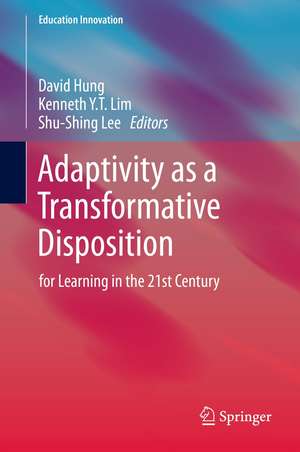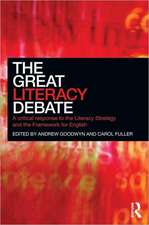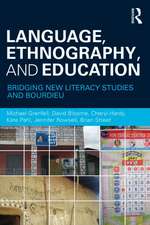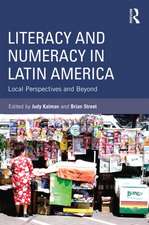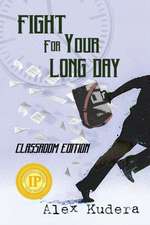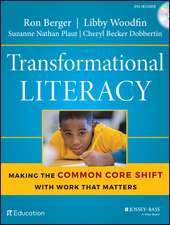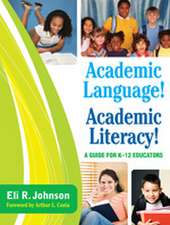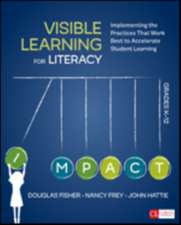Adaptivity as a Transformative Disposition: for Learning in the 21st Century: Education Innovation Series
Editat de David Hung, Kenneth Y. T. Lim, Shu-Shing Leeen Limba Engleză Hardback – 3 dec 2013
| Toate formatele și edițiile | Preț | Express |
|---|---|---|
| Paperback (1) | 642.68 lei 6-8 săpt. | |
| Springer Nature Singapore – 18 sep 2016 | 642.68 lei 6-8 săpt. | |
| Hardback (1) | 648.89 lei 6-8 săpt. | |
| Springer Nature Singapore – 3 dec 2013 | 648.89 lei 6-8 săpt. |
Din seria Education Innovation Series
- 24%
 Preț: 742.68 lei
Preț: 742.68 lei - 18%
 Preț: 732.70 lei
Preț: 732.70 lei - 15%
 Preț: 647.08 lei
Preț: 647.08 lei - 15%
 Preț: 644.63 lei
Preț: 644.63 lei - 15%
 Preț: 656.58 lei
Preț: 656.58 lei - 15%
 Preț: 648.56 lei
Preț: 648.56 lei - 18%
 Preț: 946.69 lei
Preț: 946.69 lei - 15%
 Preț: 643.34 lei
Preț: 643.34 lei - 18%
 Preț: 900.18 lei
Preț: 900.18 lei - 20%
 Preț: 571.84 lei
Preț: 571.84 lei - 18%
 Preț: 789.35 lei
Preț: 789.35 lei - 15%
 Preț: 641.03 lei
Preț: 641.03 lei - 18%
 Preț: 948.29 lei
Preț: 948.29 lei - 20%
 Preț: 564.21 lei
Preț: 564.21 lei - 15%
 Preț: 647.59 lei
Preț: 647.59 lei - 18%
 Preț: 1003.70 lei
Preț: 1003.70 lei - 18%
 Preț: 901.74 lei
Preț: 901.74 lei
Preț: 648.89 lei
Preț vechi: 763.40 lei
-15% Nou
Puncte Express: 973
Preț estimativ în valută:
124.17€ • 129.90$ • 103.14£
124.17€ • 129.90$ • 103.14£
Carte tipărită la comandă
Livrare economică 02-16 aprilie
Preluare comenzi: 021 569.72.76
Specificații
ISBN-13: 9789814560160
ISBN-10: 9814560162
Pagini: 220
Ilustrații: XVIII, 322 p. 30 illus., 1 illus. in color.
Dimensiuni: 155 x 235 x 25 mm
Greutate: 0.65 kg
Ediția:2014
Editura: Springer Nature Singapore
Colecția Springer
Seria Education Innovation Series
Locul publicării:Singapore, Singapore
ISBN-10: 9814560162
Pagini: 220
Ilustrații: XVIII, 322 p. 30 illus., 1 illus. in color.
Dimensiuni: 155 x 235 x 25 mm
Greutate: 0.65 kg
Ediția:2014
Editura: Springer Nature Singapore
Colecția Springer
Seria Education Innovation Series
Locul publicării:Singapore, Singapore
Public țintă
ResearchCuprins
Series Editors’ Foreword.- Foreword by John Seely Brown.- Section 1: Adaptivities at the Learner/Student Scale.- Chapter 1 An Epistemic Shift: A Literacy of Adaptivity as Critical for 21st Century Learning by David Hung, Kenneth Y T Lim, Azi Jamaludin.- Chapter 2: Learner Adaptivity: An Initial Conceptualisation by Elizabeth Koh, Helen Hong and Jimmy Seah.- Chapter 3: Pedagogies of Connected Learning: Adapting Education into the 21st Century by Kristiina Kumpulainen.- Chapter 4: Learning Adaptivity across Contexts by Shu-Shing Lee, David Hung, Kenneth Y. T. Lim and Imran Shaari.- Chapter 5: The Six Learnings Framework: Exploring the Dialectics of Intuition and Adaptivity in Citizenship Education by Kenneth Y. T. Lim and Matthew Y. C. Ong.- Chapter 6: Self–Social Regulation in World of Warcraft: Dialectics of Adaptivity by Azilawati Jamaludin.- Chapter 7: Developing a Habitude: When Learning Isn’t Always Fun by David Hung, Imran Shaari, Daphnee Lee, and Shu-Shing Lee.- Section 2: Adaptivities at the School and District Scale.- Chapter 8: School Leaders and Learning Cultures in School: The Case for Intelligent Leadership by Harry Daniels and Anne Edwards.- Chapter 9: Adaptivity as a Transformative Disposition of Schools for Student Learning in the 21st Century by Bill Mulford.- Chapter 10: Adaptivities in Teacher Learning within the Context of Communities of Practice: A School District’s Learning Journey by David Hung, Shu-Shing Lee, and Swathi Vishnumahanti.- Chapter 11: Creativity and Adaptivity in Arts: The Nexus and Affordances by Liang See Tan and Letchmi Devi Ponnusamy.- Section 3: Adaptivities at the Systems Scale.- Chapter 12: Teachers as Active Contributors in Quality of Education: A Special Reference to the Finnish Context by Hannele Niemi.- Chapter 13: Fostering Adaptivity through Systemic Reform: Transforming Education through the Framework of Preparing Student Abilities and Competencies through Education in Singapore (PACES) by Horn MunCheah and Kenneth Y. T. Lim.- Chapter 14: Evolvement of Low-achievement Policy in Singapore’s Highly Adaptable Education System by Siao See Teng, Li-Yi Wang, and Ching Leen Chiam.- Chapter 15: Adaptivities in the Singapore Education System: From Great to Excellent by David Hung, Shu-Shing Lee, and Kenneth Y. T. Lim.- Chapter 16: Ecological Perspective on Scaling: Balancing Structural and Individual Adaptivities by David Hung, Shu-Shing Lee, Laik Woon Teh, Yew Meng Kwan, Swathi Vishnumahanti, and Ambar Widiastuti.- Chapter 17: Conclusion: Diffusing Adaptivities through Micro-cultures of 21st Century Learning Practices and Teacher Professionalism by David Hung, Kenneth Y. T. Lim, and Shu-Shing Lee.
Textul de pe ultima copertă
This volume introduces the concept of ‘adaptivity’ as occurring when, say, individuals cross boundaries. Through illustrations from both formal and informal learning, the book seeks to provide learning designs and frameworks for adaptivity. This book is unique as it ties together: a) social-individual dialectics; and b) adaptive learning as it relates to creativity and imagination. It highlights case studies from social / new media contexts, school learning milieux, and formal and informal situations. It approaches adaptive learning from the perspectives of students, teachers, school leaders, and participants in social media and other digitally mediated environments. The book is a valuable resource for practitioners and academics who are interested in adaptivity as a learning disposition.
Caracteristici
A unique book that ties together social-individual dialectics and adaptive learning Describes fresh new case studies from social media contexts, school learning milieux, and various situations Contextualizes recommendations for fostering adaptivity as a transformative disposition for moving ahead
